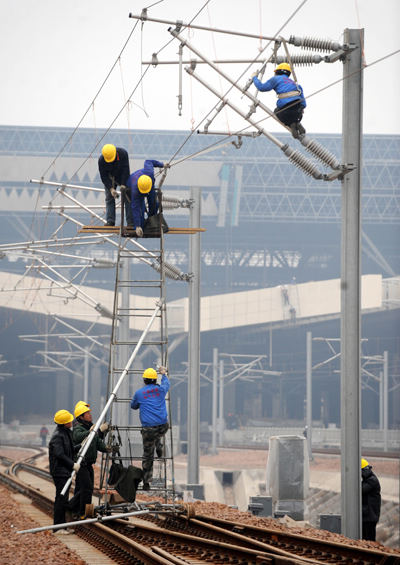 |
|
INVESTMENT CONCERN: The construction site of the electrification project of Zhengzhou East Railway Station. The IMF raised worries that over-dependence on investments may undermine China's growth momentum (ZHU XIANG) |
China has taken a number of encouraging steps, including appreciating the yuan, making substantial investments to the social safety net, expanding pension and health care coverage, raising the minimum wage, and beginning to raise the cost of inputs to production, it said. Greater efforts are now needed to raise household income and shift the growth structure from exports and investments toward consumption.
Policy incentives to boost residents' income are already in the pipeline. Last year, the country raised the cut-off point for personal income tax to 3,500 yuan ($556) from 2,000 yuan ($317). Moreover, the Ministry of Human Resources and Social Security recently announced that the country will increase the basic pension of retired enterprise employees by 10 percent in 2012, the seventh consecutive year of hikes since 2005.
At the recently concluded National Finance Work Conference, Xie Xuren, Minister of Finance, said China will continue fiscal measures to boost job creation, support needy groups in education, housing and health care, as well as control consumer prices at a reasonable level.
"The key is to foster entrepreneurship, smaller private firms, eliminate industry monopolies and bridge the widening wealth gap," said Li Yining, a professor of economics of the Peking University.
"In order to lift the income of farmers, the country should help improve added value of agricultural products, strengthen job trainings of rural residents and encourage them to start up their own businesses," said Li.
Despite a rosy near-term prospect, the IMF struck a note of caution about lingering risks facing the Chinese economy.
"The biggest concern would be a coinciding, self-reinforcing slump in both the trade and property sectors. This could precipitate a steeper-than-anticipated decline in prices, sales volumes and property-related investment," said the IMF report.
Stephen Green, chief Asia economist with the Standard Chartered Bank, warned that real estate may be the biggest risk to China in 2012.
House prices may continue to drop, and the government is likely to take measures in the second quarter to stabilize the property market, he said.
As the property market cools, buyers are hesitant to jump from the sidelines as expectations of further price dips remain high. Property developers also received a heavy blow, with their sales shrinking and balance sheet weakening.
"The appropriate response would be to boost property demand through the government purchasing homes directly for social housing purposes and selectively relaxing some of the administrative purchase restrictions for first-time buyers, lower-income groups and those seeking to buy social housing," said the report.
China's over-dependence on investment was also considered a potential source of dangers. "Continuation of the current high levels of investment may, over time, undermine bank and corporate balance sheets," said the IMF.
Zhang Monan, a researcher with the State Information Center, said excessive investments may exacerbate the problem of over-capacity.
Enterprises would have to absorb the over-capacity by strengthening exports, thus complicating the country's efforts to rebalance the economy, she said.
As they aggressively push forward with massive investments, local governments have raised a pile of debts, which sowed the seeds of financial risks, said Zhang.
The country's local government debts totaled a dizzying 10.7 trillion yuan ($1.7 trillion) by the end of 2010, according to data from the National Audit Office.
It is imperative now for China to curb the government's preference for investments, focus spending on public welfare, and encourage private investment, she said.
Email us at: huyue@bjreview.com | 